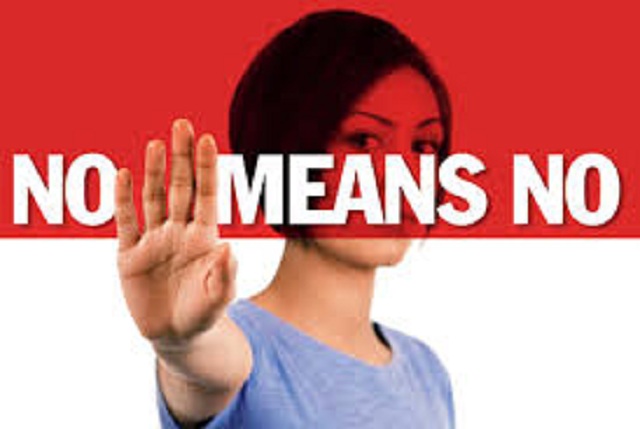Clarifying Sexual Consent: No Means No


Chamunorwa Mufaro
All our lives, women are taught to be coy, shy and sexually reserved.
Just read through articles like why you should play hard to get, or how to get a guy by playing hard to get.
There are even websites dedicated to guiding women on “the timeless art of capturing his heart”.
Also, the writers at ‘Men’s Health’ have decided to help their readers manoeuvre the ‘jungle’ that is a woman’s mind and understand why she doesn’t immediately respond to male advances.
All too often, ‘playing hard to get’ is understood to be the norm and standard of male-female courtship, with anything less or more being equated to being either ‘sluttish’ or ‘prudish’.
But what this supposed middle ground looks like remains a grey and murky area in which women’s sexuality is policed, judged and shamed.
And with this comes grave consequences for understandings of sexual consent.
Cornell University defines consent as follows: it consists of “words or actions that show a knowing, active and voluntary agreement to engage in mutually agreed upon activity.”
It should never be implied and cannot be assumed. Furthermore, it cannot be given if there is coercion, and it can be retracted at any time.
It can also not be given if the person is intoxicated or incapacitated.
Consent is, therefore, the difference between wilful sex and rape.
And yet, aside from advice columns in popular magazines, there are many ways in which society allows for the blurring of lines between yes and no.
Just a fairy-tale?
Our understandings of consent have always been problematic. Let us start at an elementary and innocuous stage; the story of Sleeping Beauty.
After she has been cast into a deep sleep, as the fairy-tale goes, Prince Charming rescues her from her death-like slumber with a warm loving kiss.
A sweet story that has been read to generations and generations of young children.
But let us think about it deeper. Something is off with this story. Isn’t Prince Charming a stranger?
And did Sleeping Beauty agree to that kiss? Why is it acceptable to us, the readers, that he kissed her without her permission?
Oh, but who needs consent? He is saving her life, many will say. And yet the truth is that this is borderline sexual harassment, neatly packaged and sugar-coated.
Now let us move back to the courtship process. It is traditionally accepted that a girl is pursued, charmed by flowers and love poems until she eventually says yes.
She might say no initially, because she can’t be easy to get. However, with just enough effort, she should say yes.
Look at ‘90 Day Rule’ which was been recommended by the reality TV life coach Steve Harvey and endorsed by another life coach, Iyanla Vanzant.
The prerequisite for sexual intercourse is not that both parties want it, but rather that the man has earned it.
She is supposed to ignore her own sexuality and desires because that’s how she ought to “Act like a Lady”.
He, on the other hand, is placed under a ‘90 day probationary period’ where he has to prove his worth and show that he deserves the perks and benefits of her consent.
Only then does he have access to the “cookie jar”.
Also, look at the institution called marriage: a popular prerequisite for sexual intercourse in many religious and cultural circles.
A man earns these sexual privileges after he has paid the bride price and gained permission from his bride’s parents. As a result, a strong element of entitlement emerges.
Clearly – using these norms – sex is not consented to, but rather, earned. This is the reason why some will even consider marital rape an absurdity, yet it is a real form of domestic violence.
The danger that comes with a feeling of entitlement to sex is that consent can be replaced by coercion, manipulation and even force.
These are all part of the many subtle presumptions that have added to the dangerous confusion around consent.
“Who has time to ask for consent?”
There is a strong misconception that consent can be implied and that this is a part of the exciting nature of human interaction.
Some will rush to the conclusion that if a woman wears clothing that reveals some skin, she is not doing it for herself but rather to invite male attention and is therefore ‘asking for it’.
Some also believe that if you take a girl out, shower her with gifts, buy her fancy drinks, invite her into your flat and she walks in, consent is implied.
“She should have known when she accepted all of those advances”.
“Who has time to ask?, “May I touch you?”, “May I kiss you?”, “May I undress you?”
Others will claim that if she knowingly gets drunk up to a point where she has lost her faculties, because she chose to drink, she is automatically culpable in any sexual interaction she becomes involved in.
But if such grey areas are accepted as a norm to consent, rape can worryingly be excused as a mere misunderstanding.
Or more so, the blame can be easily shifted to the victim.
The unfortunate situation is that these claims have been deemed acceptable and mirror society’s perceptions.
They are even part of lectures that young girls get from other women, their “tetes”, “gogos,” church mothers and even teachers.
Patriarchal definitions
There are problems with patriarchal definitions of how a woman ought to behave and this has negative effects as it leads to the dangerous perception that women should be sexually submissive “good girls” for their male partners.
As a society, we really need to revise the double standards that we hold when it comes to gender roles and the way in which the bodies and behaviours of women are constantly policed.
Consent should not be allowed to be this muddled. It should be communicated clearly and not assumed or forced.
Without consent, any sexual relation with a person constitutes rape; and rape is a major issue when it comes to violence against women.
However, until women are viewed as sexually autonomous beings, the issue of consent shall sadly remain a grey area.












Comments